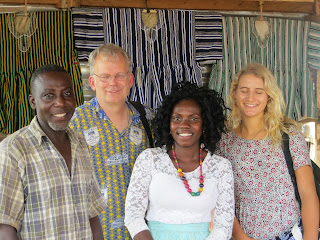
At Kpandai we were pleased to meet again with Father Mawusi,
who has been a personal inspiration
to me since Brando and I met him two years
ago. St. Kizito School is the most
isolated one we work with, and most of the students come from families who
struggle to make a living. But with
Father Mawusi’s leadership it regularly attains the top marks in its district
and among the top marks in the entire Northern Region, despite crowded
classrooms and a lack of computers. And
he is involved in much other work in the community and the surrounding area, as
well. We will miss seeing him in Kpandai
but were delighted to meet Father Alfonso and to know that Mr. Francis will
continue his fine work as Head Teacher.
Father Mawusi will be transferred to New York for several years, so we
hope to see him in Portland and that he can speak at one of our gatherings
there.
We enjoyed meeting the students of St. Kizito very much, and
they immediately demonstrated their high level of discipline and
dedication. Given how difficult it is to
get letters in and out of Kpandai, we brought the letters from their partner
school, St. Andrews, at the end of the school day, and asked that they bring
their answers the next morning so that we could take the letters with us. The next morning each and every letter had
been answered, some at great length. Mr.
Francis took us on a tour of Kpandai in the late afternoon, where we met
several students at work in shops helping their parents—and studying while they
went about their work. We got to relax a
bit at a local canteen where we enjoyed corn on the cob that Mr. Francis had
purchased on the way and pito, a popular drink brewed on the spot that we all
found highly distinctive.
Then it was off to Tamale, where thanks to Mr. Kwame’s
driving skills and Elizabeth’s map skills, we

arrived at in time to meet with
the students of ECG School before they had to go home for the day. One of the students had written a
particularly eloquent homage to Brando Akoto last last year, so it was a
pleasure to thank him for that and to tell him how much it meant to Brando’s
family and friends back in the U.S. We
also got to meet and greet the several students at the school that Yo Ghana!
helps to support through providing part of their fees. The school chooses excellent students from
families that have experienced misfortune.
As always, we were highly impressed by the curiosity of the
students and the dedication of the staff.
Mr. Joseph showed us to the fine accommodations he had made for us, and
then joined us for dinner, along with the Hurinas, missionaries from Hong Kong
who have played a crucial role in building the school up for many years. ECG is one of those schools that makes you
want to do and give more, as it is full of people who do just that.
 Next morning we had the pleasure of visiting a school
recommended a few months ago to us by WFL: Mt. Olivet School. Mt. Olivet was celebrating its twentieth
anniversary. It began as a nursery
program, and its founder, Madam Regina, kept expanding in response to parent
requests. Now it serves over 500
students. The students were performing dances, the garden had lovely
fragrances, and the staff and students were excited about their work—and to be
part of Yo Ghana!
Next morning we had the pleasure of visiting a school
recommended a few months ago to us by WFL: Mt. Olivet School. Mt. Olivet was celebrating its twentieth
anniversary. It began as a nursery
program, and its founder, Madam Regina, kept expanding in response to parent
requests. Now it serves over 500
students. The students were performing dances, the garden had lovely
fragrances, and the staff and students were excited about their work—and to be
part of Yo Ghana! 














